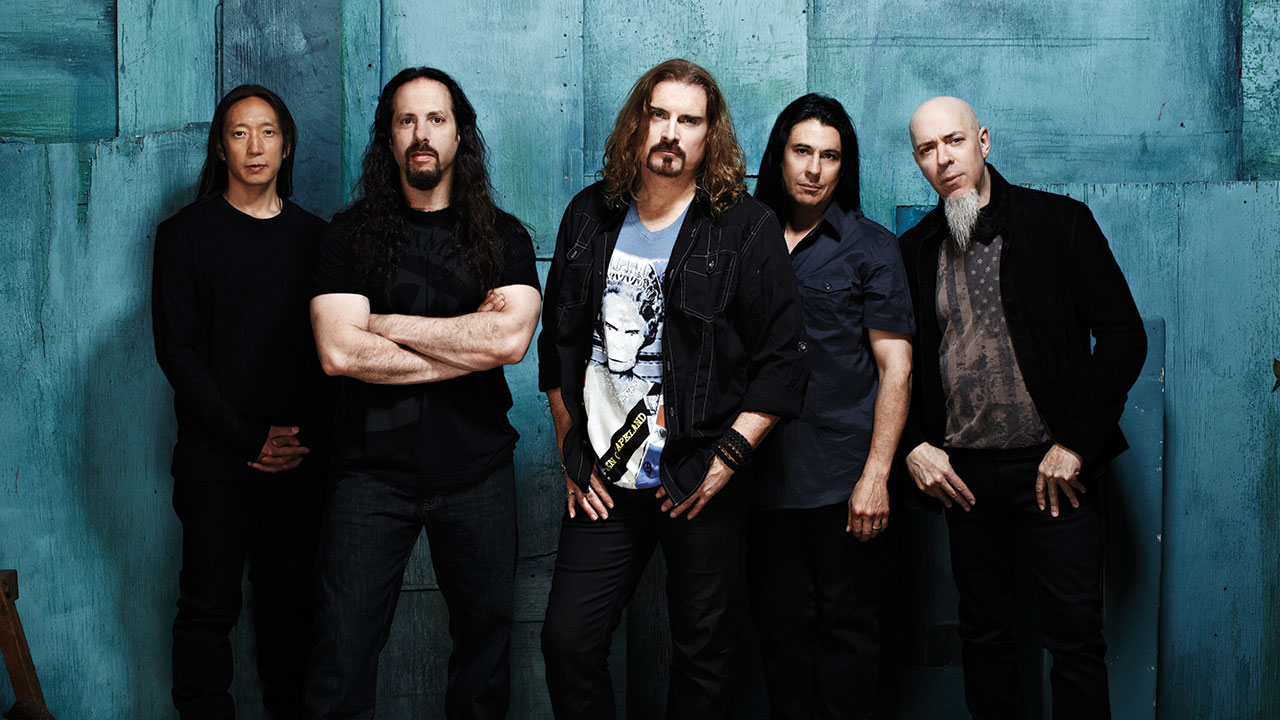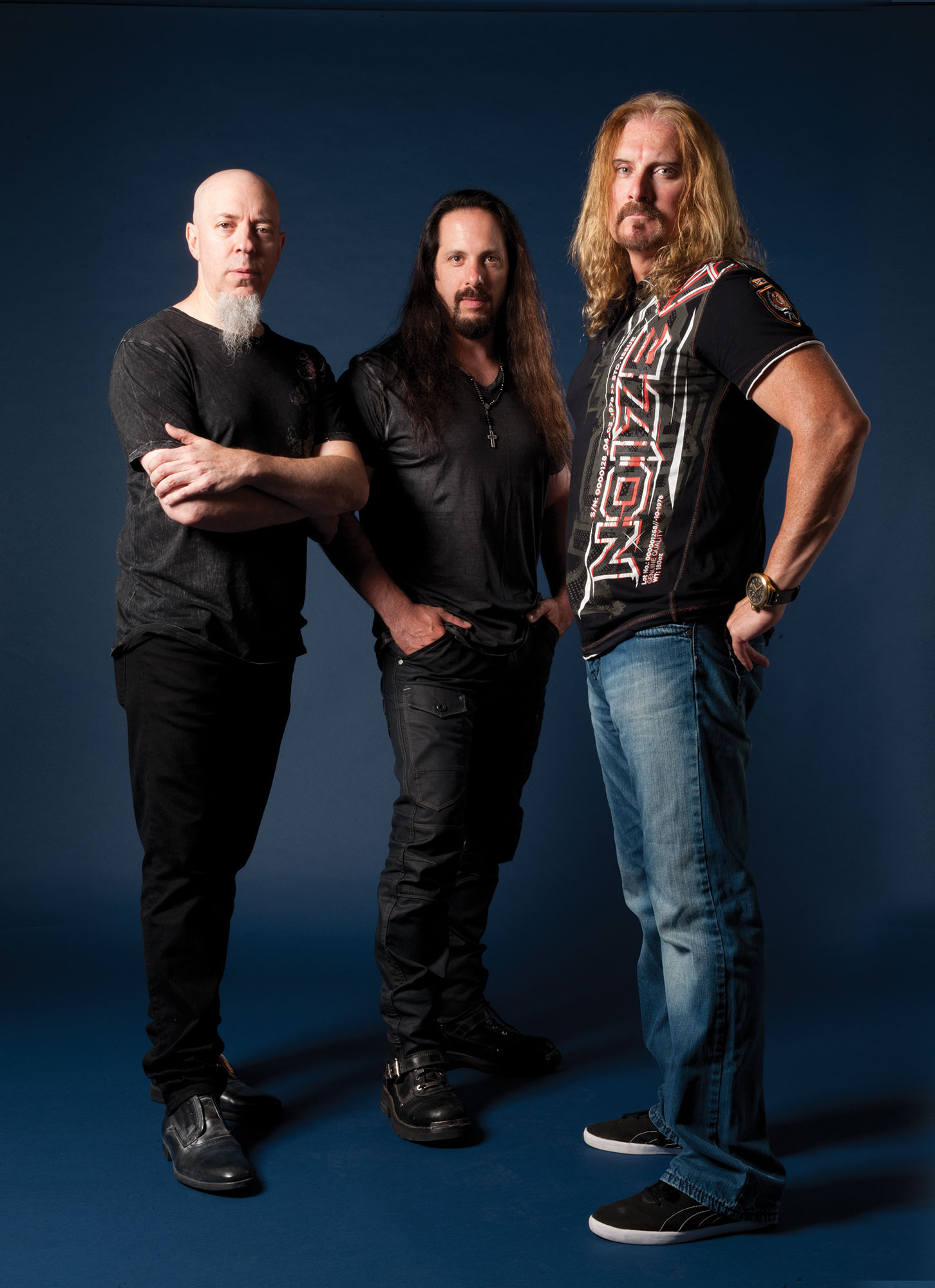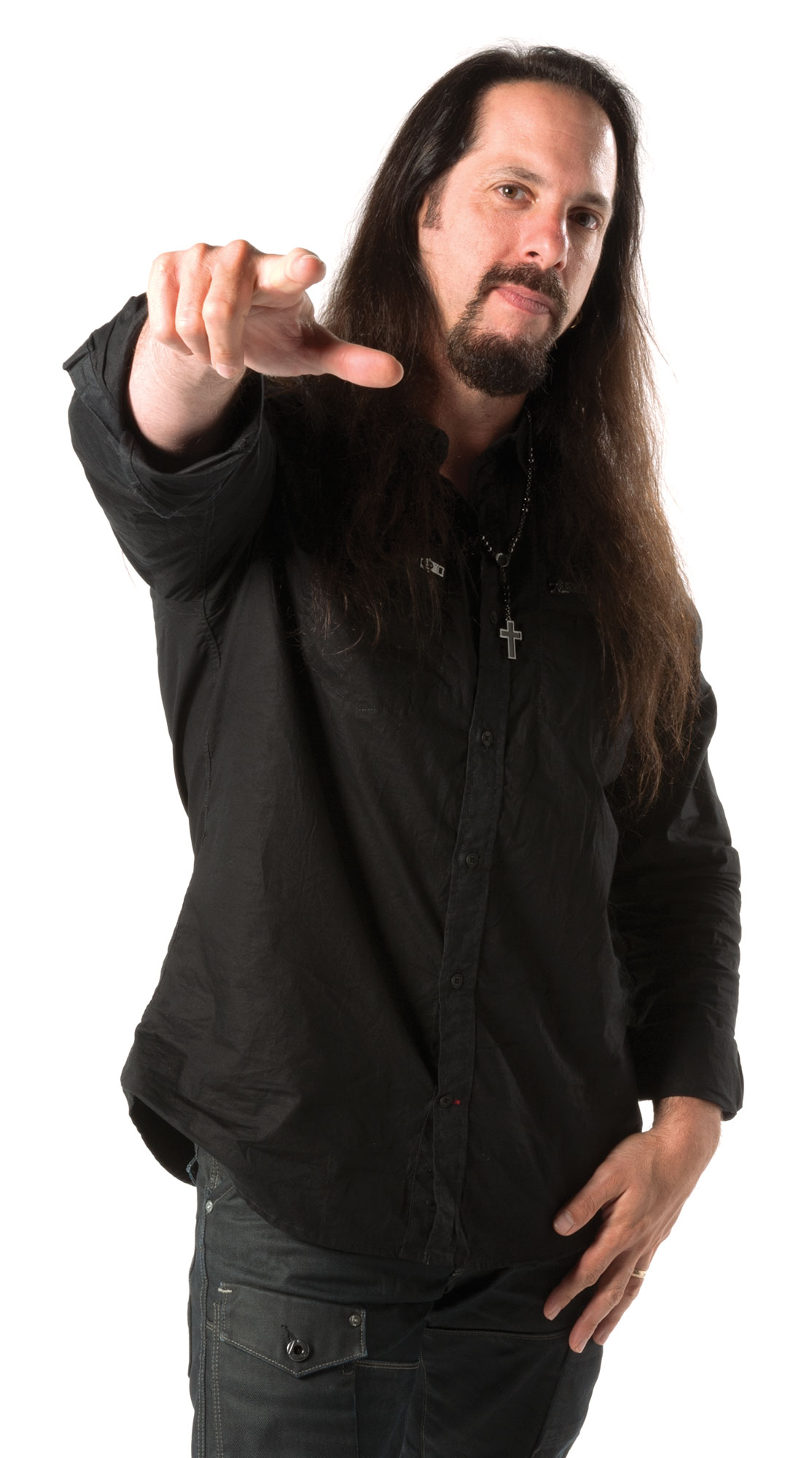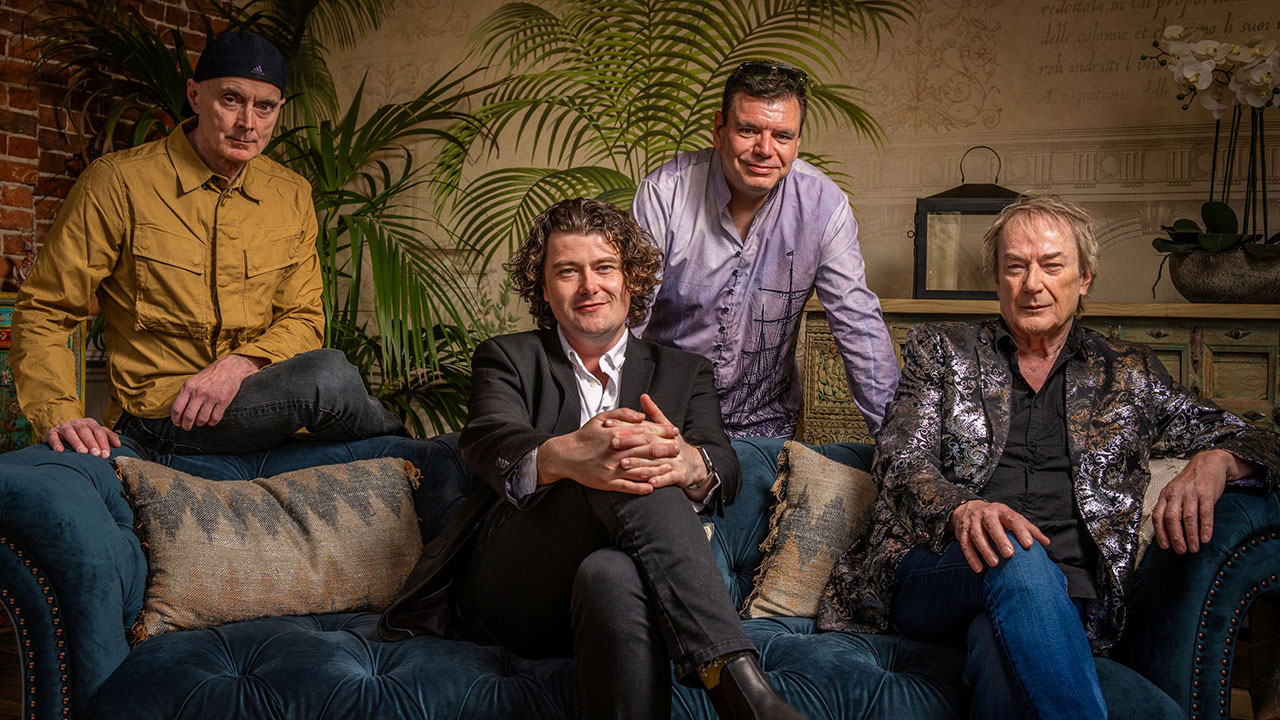"I felt that we were becoming stagnant, too controlled and led into areas that I didn’t feel too connected with." How Dream Theater continued their renaissance with their self titled 2013 album

In 2010, it seemed the dream had died for Dream Theater with the departure of co-founder Mike Portnoy. Three years later, with a much-anticipated new album due for release, things look very different. In 2013 Prog chatted with James LaBrie, John Petrucci and Jordan Rudess about the band's new self-titled album.
Dream Theater are living proof that what doesn’t destroy you will only make you stronger. It seems scarcely believable that just under two years ago, few within the prog-metal field would have been brave enough to predict the group could possibly survive, let alone flourish, without the input of Mike Portnoy, the drummer, songwriter, co-producer and publicity dynamo who resigned so shockingly in September 2010.
Most believed the band insane to rebuff Portnoy’s plea to rejoin, after the drummer changed his mind, though they were to have the last laugh over the sceptics when they hired former Steve Vai/Extreme/Annihilator man Mike Mangini and set off on a lengthy world tour for their aptly titled – and yes, critically acclaimed – comeback disc, A Dramatic Turn Of Events.
Instead of playing to smaller halls as their appeal became more select (à la Spinal Tap), something unexpected happened. ADTOE’s first single, On The Backs Of Angels, was nominated for a Grammy in the Best Hard Rock/Metal Performance category. Although the group lost out to White Limo by Foo Fighters, it was their first sniff of acceptance at the Grammies.
Meanwhile, out on the road, the new-look Dream Theater began to, in the words of Mangini, “partake in a glass of wine and talk to one another” after their shows, when previously they’d have scattered to their rooms to surf the internet or, more likely still, practise their instruments.
The increased levels of interaction and bonhomie were such that keyboard player Jordan Rudess finally dared to address the elephant in the room. “Never say never but at this point I really don’t see Mike [Portnoy] coming back,” he told your correspondent during an interview for Prog’s sister title, Metal Hammer. “Things are so good right now that I wouldn’t be surprised if this line-up of Dream Theater was to continue until we’re all ready to throw it all in. I wouldn’t want any more changes.”
Indeed, with no further line-up tweaks, the band continue their winning streak with a new self-titled studio album – their twelfth in a career that dates back to 1985.
Sign up below to get the latest from Prog, plus exclusive special offers, direct to your inbox!

“Dream Theater has become a much more free-thinking, positive-spirited, camaraderie-based band than it’s ever been,” observes singer James LaBrie proudly. “This time Mike Mangini was there from the beginning and he created the backbone to the music, not just with his phenomenal drumming but via the amount of crucial ideas that he contributed to this record. I’m sure the others would agree with me in saying Mike is its star.”
Understandably, Dream Theater prefer to focus upon their excellent new record and the band’s standing in 2013 than to rake over the old ground of the Portnoy era. But it’s hard to consign the subject to history. Although LaBrie doesn’t say so, you get the impression that there’s no love lost on his part, while Jordan Rudess revealed in the Hammer interview that he’d sat on the steps of the studio and wept upon receiving confirmation of Portnoy’s departure. LaBrie, who hasn’t spoken to his band-mate of almost two decades since the group meeting at which he announced his intention to leave, seems almost blasé by comparison.
“I saw it coming – we had been turning a blind eye to what was very apparent,” the singer shrugs. “Mike had been touring with Avenged Sevenfold and it was obvious how confused he was becoming. He was burnt out with this band.
“To me,” adds the affable Canadian, selecting his words carefully, “I felt that Dream Theater was becoming stagnant – we were too controlled [by Portnoy] and led into areas that I didn’t feel too connected with. I felt that with Black Clouds & Silver Linings and Systematic Chaos, our music no longer necessarily enveloped all of the styles for which we’d become known. The metal aspect was becoming too concentrated. Whereas with A Dramatic Turn Of Events there was a beautiful balance between progressive rock and metal, and it was also a melodically brilliant album.”
Ouch!

Unlike LaBrie, guitarist John Petrucci has made his own peace with Portnoy – quietly and without fuss. It’s a subject that he has to be asked about, rather than volunteering anything himself.
“There’s been some contact between us – I don’t think Mike would want me to keep that private,” Petrucci says. “What happened between us was a moment of turmoil, but Mike and I have been friends since I met him as an 18-year-old at Berklee College Of Music and we’ve played ever since, not only with Dream Theater but with Liquid Tension Experiment and on my solo tour. Our families grew up together on tour buses, our wives [Rena and Marlene] played in a band [Meanstreak] together – that’s how we met them. That’s a lot of intertwining history.”
With both parties prospering, it would perhaps be churlish to let old wounds fester. Petrucci speaks with pride of the night that he and the rest of the group attended the Grammies.
“It was so, so exciting,” he relates. “We’ve been blessed with a long and great international career with fans all over the world. It’s been an amazing ride but the Grammies were always elusive. So just getting the call to say that we’d been nominated was incredible, especially when you play the kind of music that we play.
“We took our families and had a great night. The recognition felt awesome and hopefully it won’t be the last time we get to go there.”
My two decades of interviewing John Petrucci suggest a quiet, modest guy, though the guitarist doesn’t mind admitting that the success of ADTOE brought him a real sense of vindication.
“That’s such a great word,” he chuckles. “When Mike left it was definitely a turning point – we knew that people would be anxious to see what happened next. Every time something happened… the album debuting in the Top 10, the Grammy nomination… yeah, ‘vindication’ is the perfect word. We are not so much relieved, but very comfortable with the place we are at.”
Since the day Portnoy quit, the phrase ‘Dream Theater are bigger than one individual’ has appeared in many of the band’s interviews. But could they continue to exist if John Petrucci decided enough was enough?
“Wow, man,” replies the guitarist, before he guffaws with laughter. “Nobody wants to think that would happen. How do I even answer that… it’s nasty. No, I don’t even know what to say.”
But the question remains. Having shouldered much of the responsibility for writing ADTOE, with generous assistance from Jordan Rudess, the guitarist has settled comfortably into the role of the band’s sole producer. Until Portnoy’s departure, this was a task the pair had shared since taking over from Kevin Shirley circa 1997’s Falling Into Infinity.
“Along with writing the lyrics, it’s becoming a passion of mine, though one of the reasons this new album sounds as good is due to having Rich [Chycki, the Rush engineer/mixer] involved,” he says. “I can’t stop playing it in my car; it really jumps out of the speakers.”
Writing credits are a subject that Dream Theater fans obsess over, using song compositions to support all sorts of personal theories. For instance, James LaBrie had just three songs on A Dramatic Turn Of Events, nothing at all on 2009’s Black Clouds & Silver Linings and a solitary tune on 2007’s Systematic Chaos. Given that breakaway records often imply frustration with an artist’s ‘main’ band, can his recent solo album, Impermanent Resonance, be interpreted as a statement upon the singer’s role within Dream Theater?
“Not at all,” James sighs. “From the day the band began, its main composers were John Petrucci and Kevin Moore [keyboards, 1986-1994], and now it’s John Petrucci and Jordan Rudess. That doesn’t mean I’m not involved, but the vast majority of each album comes from whoever is in the driving seat. The great thing about this band right now is that everyone is comfortable and happy in their own particular role.”
For what it’s worth, LaBrie has co-written six tracks on the new album, with Mangini involved in all but two of its nine selections.
“Having a new creative person in Dream Theater for the first time since Jordan joined [in 1999] was really cool,” Petrucci comments. “For this album we set up as a band in the studio with all of our live gear, trying out ideas on the spot and improvising as we went along. It’s a method we’ve used before, but not for a number of years.”
“Each person turned up with basic ideas on their iPhone and we worked upon them as a team,” adds Mangini. “It was a complete group effort.”
Even as the so-called ‘new guy’, Mangini (who joined Dream Theater in April 2011) was warmly welcomed into their creative hub.
“All the same, I had to be careful,” he qualifies. “Besides my speed at picking up on musical patterns, I’m also good at picking people patterns. I knew when it was best to not say a word. A video filmed during the session would show the epitome of respect and teamwork; people feeling confident about verbalising what they wanted to get across.”
Mangini appreciated that sense of support. Asked if he was made to feel 100 per cent secure in his job, he pauses for thought.
“Things take time,” he finally replies. “The Johns [Petrucci and Myung, bass] have been together their whole lives. Although James is not a founding member, factually speaking, he cannot be seen as anything but. And my gosh, look what Jordan did on Scenes From A Memory [their 1999 masterpiece concept album]. Given all of that, I’m in where I’m in, and I’m way more comfortable than anyone would expect me to be.
“We are in a boat,” he continues, clearly on a roll. “We are propelling it forwards as one and making huge waves behind us, but the great thing is that nobody is looking back.”

However they did it, Dream Theater is an exceptional piece of art. The album’s biggest talking point is its final song, Illumination Theory – a five-suite monster epic that incorporates a symphonic segment and a false ending that drags it past the 22-minute mark. Laughing, Petrucci is happy to lay the blame for its excesses on Rich Chycki.
“Rich realised we had 20 minutes of space left on the record and said: ‘Why don’t you write one massive song to fill it?’ We hadn’t been planning on doing that, but it had been quite a while since we did anything in that vein so it worked out very cool. It was great to break a few of the normal song structure boundaries – that’s what progressive music is all about.”
Rather than resorting to samples, the band brought in a student from Berklee named Eren Basbug for the orchestral arrangements and to conduct a small string section. “He did a great job,” Petrucci enthuses. “We had maybe eight or nine pieces but once what had been recorded was layered, it sounded like there were 50 people playing on it.”
Besides a bill-topping spot at the second High Voltage festival, the tour for ADTOE saw Dream Theater headlining Wembley Arena for a third time. Indeed, they return there on February 14, 2014, as part of a three-show UK visit. An outsider to this scene might wonder how the band accomplished it.
LaBrie says: “The UK has really come around for us. We started well and then our career seemed to experience a bit of a lull before Scenes From A Memory allowed us to build things up again. Our support comes primarily from magazines and the internet, but all of our fans are very committed to who we are and what we stand for.”
Petrucci agrees: “We’ve always been told that our songs are too long and that there are too many notes, but those are the exact things that have made us strong, unique and successful.
“I firmly believe that consistency is the key. If you can keep on doing that with every album, with every tour, people learn what to expect. Even from the band’s point of view, we enter each record with the mindset of: ‘Wow, here we are again. This is going to be another great experience.’ That’s how we always manage to top the last one and keep things fresh.”

Dave Ling was a co-founder of Classic Rock magazine. His words have appeared in a variety of music publications, including RAW, Kerrang!, Metal Hammer, Prog, Rock Candy, Fireworks and Sounds. Dave’s life was shaped in 1974 through the purchase of a copy of Sweet’s album ‘Sweet Fanny Adams’, along with early gig experiences from Status Quo, Rush, Iron Maiden, AC/DC, Yes and Queen. As a lifelong season ticket holder of Crystal Palace FC, he is completely incapable of uttering the word ‘Br***ton’.
